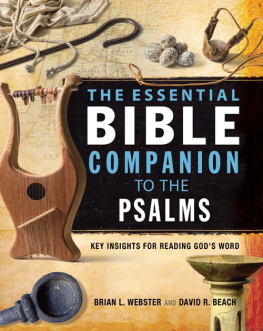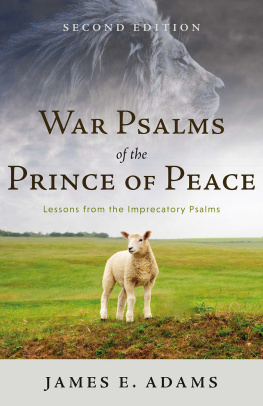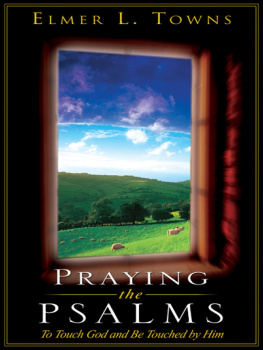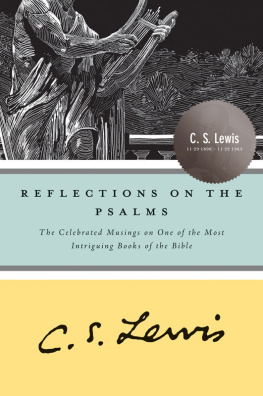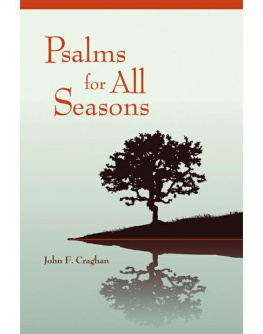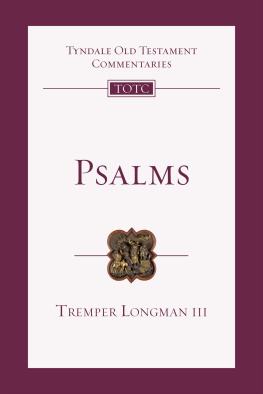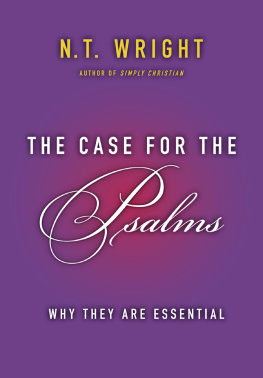WISELY, PRAY THE PSALMS
Ambrose Tinsley, OSB
Wisely, Pray The Psalms
A Prayerful Companion to Reading the Psalms

First published in 1993 by

55A Spruce Avenue, Stillorgan Industrial Park,
Blackrock, Co. Dublin
This edition, 2014
Cover by Bill Bolger
Origination by The Columba Press
Printed in Ireland by SprintPrint Ltd.
ISBN 978 1 78218 170 5
Note
The title of this book comes from a psalm-verse which St Benedict used when speaking in the famous Rule about the saying or the singing of the psalms. The phrase he knew was Psallite sapienter and comes from the Latin (Vulgate) psalter. It could be translated sing ye wisely or wisely, sing the psalms or wisely, play the harp and sing the psalms. The version used today in Roman Catholic liturgy reads sing with all your skill. It can be found in Ps 46/47.
Quotations from the psalms are taken from the Grail translation and are used by permission of A. P. Watt Ltd, London.
Copyright 2014, Ambrose Tinsley OSB
CONTENTS
INTRODUCTION
It was suggested to me years ago that I should write a book on Psalms. But what kind of book? I thought about it for a while and then decided that the most important things had probably been said a hundred times and, more deflatingly, that, without special academic training, there was little I could do except, perhaps, give encouragement to people to take up the Psalms and then to read them for themselves.
I would urge you to spend quite a lot of time looking at, mulling over, reading privately the psalms.
Those words of Cardinal Basil Hume, when he was Abbot of the monastery at Ampleforth, sum up quite well the kind of thing which down the years I have not only tried to do myself, but have proposed to others, whether clerical or lay. Indeed I am convinced that it is often quite enough because the Psalms, as many people testify, have their own way of speaking to the human heart and human hearts have their own way of understanding what the psalmist really means and of responding to the One of whom they speak.
And yet I must confess that in myself I found the urge to write this book. It came, to some extent, from the conviction that we all can help each other to discover what the Spirit says (and not just through the psalms, although of course it is the psalms which will concern us here). It came, as well, from the awareness that there are, in fact, so many people who have helped me down the years to value and to pray the psalms and that, if I acknowledge them in general and sometimes by a special reference, they may, through my words now, be able to help other people too. To them this book is definitely due.
It is a book for those who use, or want to use, the psalms in their own private prayer. Some will, perhaps, possess a copy of the Churchs Daily Prayer and they may use it, or a part of it, each day. It is with them in mind that when I quote a psalm-verse it is taken from the version which they know, the one known as the Grail translation, which Collins published many years ago. It has, of course, its limitations; the most annoying is no doubt its use of non-inclusive words. I have in places tried to rectify that fault but must in many cases leave that to the reader to do for him or herself.
However, I would hope that what I write will be of value too to those who just dip into their own Bibles and who, therefore, use the psalms in a less structured way. I hope that they will be encouraged by my overall approach and that their love for these old treasured prayers will consequently grow. And, to facilitate them, I have given to each psalm which I have quoted both its number in the Grail edition (and the Prayer Book of the Church) and that which can be found in most of the editions of the Bibles which are sold in shops today. The Bible-number generally is one more than that used in liturgical editions.
But let me also say a word about the structure of this book. The first part is an outline presentation of the psalms and in a three-fold pattern which will become, as the last section shows, the movement of the Trinity itself. The second part builds on the first and offers certain psalms, or verses, which the reader can take up and use for his or her own personal retreat. The third part speaks about the cursing-psalms, about the dignity of those who have been called to share the life of Christ and then about that deep and silent prayer which takes place in the heart and which becomes a witness to the Spirit dwelling there and to the fact that we are, somehow, in that unifying Trinity itself! As for the Notes, let me just say that, while they should be useful to those readers who have at their side a Bible or a Psalter, they contain as well a number of important points which should be in the text itself but could not find a place. And so they too, I would suggest, are worthy of attention.
And so, to come back to our basic theme, I pray that as we celebrate the words which we discover in the psalms we will be guided by the Spirit to become ourselves a word, a word which echoes Christ who is the Word-made-flesh, a word which through him now gives glory to the Father of us all. Amen, so let it be.
Part One
ESSENTIALS
Personalities
There are many people, or rather types of people, who reveal themselves to us when we sit down and quietly read through the psalms. Some lines indeed, when we reflect on them, appear quite clearly to be spoken by a different person than the ones which went before and those which come immediately after often seem to be the words of someone else. Of course there are no captions indicating who says this or that, as there would be in, let us say, an ordinary play, and so we have to learn how to supply this information for ourselves. I will give some examples in a moment of the kind of people whom we will discover but allow me first to say that, if we want to find the different characters, the lines may have to be divided in a way which does not correspond to the divisions in the printed text nor to the way the psalms are often sung. There is another rhythm, we might call it a dramatic rhythm, in the text and it can often be for us rewarding to discover what it is.
The personalities, whom we will find when we begin to look for them, will certainly include such people as the Pilgrim who is travelling, or who wants to travel, to some holy place. They will include the Scholar too, by which I simply mean the one who likes to read the sacred books and then to ponder carefully the message they contain. And then there may appear to us the Wise Man or the Sage, that is the one who, from the wealth of his experience, desires to share with other people insights about life which he himself has managed to acquire. And after that the Prophet, who consoles or even warns the people whom he meets, may make his presence felt. And finally there is the King, that dominating figure who lived in Jerusalem and who from there, at least implicitly, directed the activity of all. We could go on. Indeed one fairly recent author made a list of thirty personalities but let me settle, for the most part, for these special and important five.
However, we must admit that these personalities lived a long time ago. And yet it can be said that they are also accessible today. Indeed, and this is most important for our own use of the psalms, these personalities whom I have mentioned here are in each one of us as well! They may not be so, I agree, in a developed or much less a perfect way but they are there, and what is more they all with some encouragement can grow. And so as we reflect upon the psalms we can discover in ourselves some elements of all these five and even come to realise that we, to some extent, are they!
Next page

